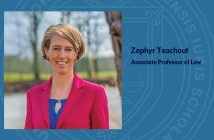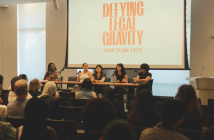Students in Fordham Law’s Federal Litigation Clinic recently had the rare opportunity to collaborate with Fordham Law faculty at the intersection of legal theory and practice.
Students represented Fordham Law scholar Ethan Leib, the John D. Calamari Distinguished Professor of Law, who submitted an amicus brief in People v. Hernandez (2024), a case before the New York Court of Appeals involving a defendant with a prior conviction who was seeking to reduce the sentence of his most recent conviction.
Leib’s research and scholarship includes extensive writing on issues related to statutory interpretation, legislation, and judicial review. The amicus brief was based on an article Leib recently published in the Notre Dame Law School Journal of Legislation, arguing that there is “interpretive divergence” between statutory and contract cases in how the New York State Court of Appeals interprets the law.
Based on these findings, Leib’s brief urged the court to “consider statutory structure and context, legislative history, and legislative intent, as well as the language of the statute,” rather than using a more “literalist reading” of the statutes. This interpretative approach, according to Leib, could allow for a more lenient sentence for the defendant.
The case also provided an opportunity for students to expand their legal research and writing skills. “I’ve grown so accustomed to trying to train 1Ls in basic doctrinal courses—my teaching portfolio essentially only has me meeting students in their first year—that I rarely get the privilege to see them ripen into sophisticated lawyers,” said Leib. “Watching them translate my academic ideas into a persuasive brief for the court was a pleasure and an honor.”
Over the course of two semesters, 7 Fordham Law students—Emma Bellows ’24, David Bloomquist ’24, Brennan Corriston ’24, Steven McFarland II ’24, Sarah Wiik ’24, Tamara Zapata ’24, and Rachel Zhu ’24—were involved in the case by contributing legal research to support Leib’s argument.
“Working on this amicus brief was a rewarding experience,” said Corriston. “I was grateful for the chance to hopefully help contribute to a fair and just outcome for Mr. Hernandez and to argue for a grounded and constitutional reading of the law. Not only did I learn about an area of the law that was new to me—state criminal and sentencing law—I learned a lot from working with the terrific team of professors and other students to ground our amicus brief in the statutory interpretation precedent of the court.”
“The students read Professor Leib’s work in this area, read the Hernandez materials, researched the Court of Appeals cases, and found a long line of cases that use the interpretive approach about which Prof. Leib has written,” said Fordham Law Professor Ian Weinstein, who supervised the students working on the brief. “It was a great project for the students, it was an interesting question of law, and it was wonderful to represent my learned colleague with our students,” said Weinstein.




